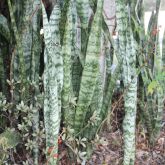Mother-in-law's tongue

Mother-in-law's tongue close-up
© Queensland Government

Mother-in-law's tongue invading native vegetation
© Queensland Government

Mother-in-law's tongue
© Queensland Government
Native to Nigeria, mother-in-law's tongue is an upright, succulent plant.
A popular garden species, it is easily spread through dumping of garden waste. Bushland infestations of mother-in-law's tongue can crowd out low-growing native plants.
Mother-in-law's tongue is not a prohibited or restricted invasive plant under the Biosecurity Act 2014.
Scientific name
Other names
- Snake plant, bowstring hemp, good luck plant
Description
- Upright, succulent plant up to 60cm tall.
- Leaves are stiff, lance-shaped, 0.6–1.2m long, dark green with mottled grey-green and yellow.
- Flowers are small, tubular, cream to green, 25–30mm long, carried on spike.
- Fruit are small, round, orange berries, 7–9mm in diameter.
- Seeds are pale brown, oblong, 6–7mm long, 5mm wide.
- Rhizomes are bright orange, thick, fleshy, succulent.
Habitat
- Prefers well drained soils in shady areas, but will tolerate dry periods.
- Found along roadsides and in gardens, disturbed areas, riparian vegetation.
Distribution
- Common throughout eastern Queensland.
Life cycle
- Flowers mostly during spring and summer.
Impacts
Environmental
- Forms dense infestations, preventing regeneration of native plants in bushland and eventually forming monoculture.
How it is spread
- Rhizomes spread in dumped garden waste
- Seeds spread by birds and other animals.
Prevention
Control
Physical control
- Carefully dig out isolated plants and small infestations, making sure to remove all roots and fragments.
- This requires persistent effort, regular site monitoring, and removal of any new growth and its rhizome.
Herbicide control
- No herbicide currently registered; however, an off-label use permit exists (PER11463).
See the Mother-in-law's tongue fact sheet (PDF, 1.8MB) for herbicide control and application rates.
Biological control
- No known biological control agents.
Legal requirements
- Mother-in-law's tongue is not a prohibited or restricted invasive plant under the Biosecurity Act 2014. However, by law, everyone has a general biosecurity obligation (GBO) to take reasonable and practical steps to minimise the risks associated with invasive plants under their control.
- Local councils must have a biosecurity plan that covers invasive plants in their area. This plan may include actions to be taken on Mother-in-law's tongue. Some of these actions may be required under local laws. Contact your local council for more information.